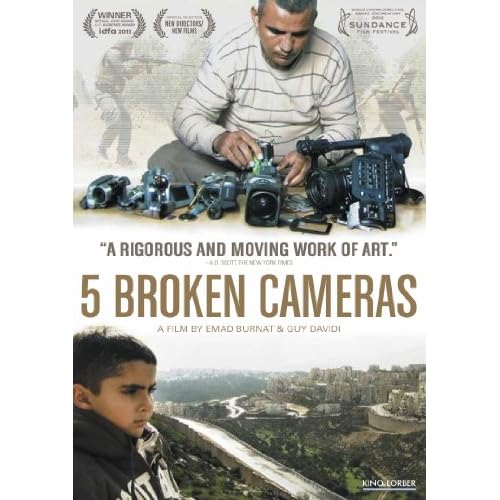January 25, 2013
“5 Broken Cameras” Documentary Review
Peter Miller
Ever since the latest assault by Israel on Gaza, which resulted in over 130 Palestinian deaths, and displayed the terror used by the Israeli Government in order to perpetuate the colonization of Palestine, more and more Canadians have started to question Canada’s unconditional support of Israel.
Now two documentaries critical of Israel, “5 Broken Cameras” and “The Gatekeepers” are nominated for the Academy Awards as best documentary film.
“5 Brocken Cameras” follows the story of Emad Burnat as he films his village’s resistance to a separation fence implemented by Israel that expropriated Palestinian agricultural land. The film is structured around the destruction of Burnat’s 5 cameras that occur between 2005 and 2009. At one point, Burnat’s camera saves his life when a bullet is fired into it as he is filming.
The documentary displays an inspiring, non-violent resistance from villagers in Bil’in, who received solidarity from around the world as they protested the occupation of their agricultural land. Emad Burnat and many of the villagers are unemployed and live off the land, harvesting olive trees. Therefore, losing their land brings great hardship to the people in Bil’in. The documentary shows the tremendous courage of the Palestinian protestors, who face relentless repression by Israeli solders as they take part in weekly protests and direct action in order to get their land back.
Two of Burnat’s best friends are leaders of the resistance, and particularly inspiring. Bassem Abu Rahmah who also goes by Phil in the film, is loved by all the children in the village. Burnat’s filming reveals Phil’s kind-heartedness as he plays with children and jokes with his friends. It is amazing to see Phil act as such a strong, loving spirit encouraging fellow villagers to take part in the struggle, despite all of the hardship that has occurred.
Burnat’s other close friend is Adeeb Abu Rahmah. His bravery is shown many times. At one point he hugs an olive tree, demanding the soldiers turn around and leave the land. At another time he falls purposefully on the ground while in confrontation with Israeli Soldiers during a protest. He spreads his arms out and dares the soldiers to shoot him. Soon after while still on the ground, he again begins demanding them to leave.
The inspiring film can also be hard to watch. Terrifying examples of Israel’s repression of Palestian protest are caught on Burnat’s camera. In nightly raids, Israeli soldiers arrest children in the village and take them away for the night in order to make them afraid of ever protesting again. During protests, shots are fired, and tear gas is always used. One of Burnat’s friends dies from a gunshot wound, 2 of his brothers are arrested, and at one point, Burnat’s camera captures a soldier shooting his brother at point blank in the leg, as other soldiers hold his brother down.
Burnat is targeted because his videography is documenting the gruesome repression of his villagers, and helping motivate solidarity around the world for Palestinian people. At one point he captures soldiers coming to his door in order to arrest him during a nightly raid. He is placed in house arrest at one point, and films himself during it because he has hardly anything else to do.
The film’s nomination in the Academy Awards is a positive development. Let’s hope that it’s nomination will cause more people to see it, and become witnesses to the colonization of Palestinian land by Israel. Let’s also hope that as more and more people watch this film they not only witness the repression of Palestinian people, but also are galvanized to take action against Canada’s unrelenting support of Israel’s crimes. Let’s keep our fingers crossed that that film wins at the Academy Awards and sends a message to Canadian and American people that our governments are on the wrong side of history when it comes to this conflict.


No comments:
Post a Comment